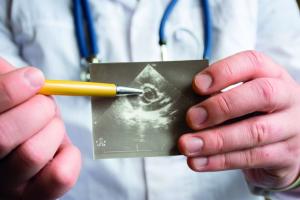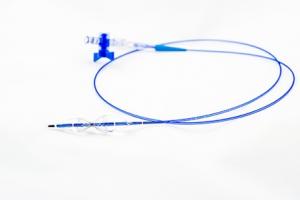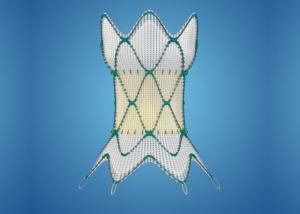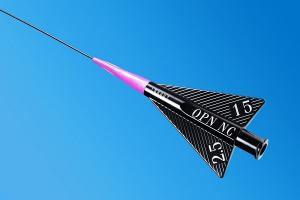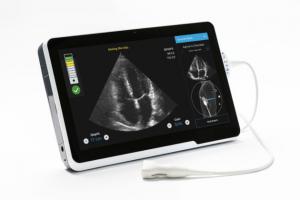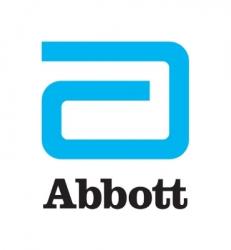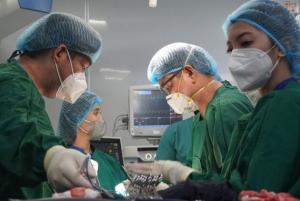Saranas has announced that it has reached the midpoint for enrolment in SAFE-MCS, a multicentre, single arm, open-label clinical trial evaluating the safety of complex high-risk percutaneous coronary intervention (PCI) using mechanical circulatory support (MCS) and surveillance with the Early Bird bleed monitoring system.
A prospective observational study had found that, in asymptomatic persons, subclinical obstructive coronary is associated with a more than eight-fold elevated risk for myocardial infarction (MI).
Assessing myocardial viability does not aid the selection of patients who will benefit—or not—from percutaneous coronary intervention (PCI) for the treatment of severe ischaemic cardiomyopathy. This is according to the findings of an analysis of the REVIVED-BCIS-2 trial, in which investigators assessed the effect of myocardial viability, functional recovery and PCI on clinical outcomes in the trial.
A new trial of endovascular ultrasound-based renal denervation technology has found that it reduced blood pressure in hypertensive patients at two months. The RADIANCE II study, published in The Journal of the American Medical Association (JAMA), was carried out by a team led by Michel Azizi (Université Paris Cité, Paris, France). The international, multicentre, sham-controlled randomised clinical trial was aimed at determining the procedure’s safety and efficacy “in the absence of the potentially confounding influence of antihypertensive medications”.
Edwards Lifesciences has highlighted new data examining mortality rates and cardiac damage of early-stage aortic stenosis (AS) sufferers, along with data examining 10-year transcatheter aortic valve implantation (TAVI) re-intervention rates using real-world Medicare data.
Neovasc has announced that its shareholders have approved the previously-announced acquisition of all of the outstanding common shares of the company by Shockwave Medical by way of a statutory plan of arrangement at the special meeting of shareholders held today this week.
Medtronic has announced the relaunch of its Harmony transcatheter pulmonary valve (TPV) system, a minimally invasive alternative to open-heart surgery for congenital heart disease patients with native or surgically repaired right ventricular outflow tract (RVOT).
SIS Medical AG has announced the launch of its OPN NC percutaneous transluminal coronary angioplasty (PTCA) dilatation catheter with ‘Twin-Wall’ technology in the USA.
GE HealthCare has signed an agreement to acquire Caption Health, a developer of artificial intelligence (AI)-driven ultrasound technology.
Abbott and Cardiovascular Systems (CSI) have announced a definitive agreement for Abbott to acquire CSI. Under terms of the agreement, CSI stockholders will receive US$20 per common share at a total expected equity value of approximately US$890 million.
Performance improvement company Biome Analytics has announced the publication of a study in Circulation: Cardiovascular Quality and Outcomes, resulting from its collaboration with researchers at University of California, San Francisco (San Francisco, USA) and Cedars Sinai Medical Center (Los Angeles, USA)
AtriCure has announced that the first patient was treated in the LeAAPS clinical trial, a prospective, randomised clinical trial to evaluate the safety and effectiveness of the AtriClip (Atricure) left atrial appendage (LAA) exclusion system for the prevention of ischaemic stroke or systemic arterial embolism in cardiac surgery patients at elevated risk for these events and with no history of atrial fibrillation (AF).

Performance diagnostique de l’interféron gamma dans l’identification de l’origine tuberculeuse des pleurésies exsudatives

A Mixed Phenotype of Airway Wall Thickening and Emphysema Is Associated with Dyspnea and Hospitalization for Chronic Obstructive Pulmonary Disease.

Radiological Approach to Asthma and COPD-The Role of Computed Tomography.

Significant annual cost savings found with UrgoStart in UK and Germany

Thrombolex announces 510(k) clearance of Bashir catheter systems for thromboembolic disorders
Phone: (028) 3981 2678
Mobile: 0903 839 878 - 0909 384 389












